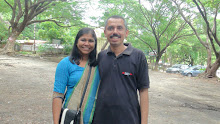
Bhaja govindaM is one of the minor compositions of the spiritual gaint, Adi SHANKARA. It is classified as a Prakarana grantha, a primer to the major works. Though sung as a bhajan, it contains the essence of vedanta and awakens the man to think, "Why am I here in this life ? Why am I amassing wealth, family, but have no peace ? What is the Truth ? What is the purpose of life ?" Man is thus awakened and gets set on a path to the inner road back to God.
The background of Bhaja GovindaM is worth examining. During Shankara's stay in Kashi, he noticed a very old man engaged in the early hours studying the rules of sanskrit by Panini. Shankara was touched with pity seeing the plight of the old man spending his years at a mere intellectual accomplishment while he would be better off praying and spending time to control his mind. Shankara understood that the majority of the world was also engaged in mere intellectual, sense pleasures and not in the divine contemplation. Seeing this, he burst forth with the verses of Bhaja govindaM.
In 31 (some cite 33) verses, he, like no other, explains our fallacies, our wrong outlook for life, and dispells our ignorance and delusions. Thus bhaja govindaM was originally known as Moha Mudgara, the remover of delusions.
Shankara explains, nay chides, us for spending our time in useless trivia like amassing wealth, lusting after (wo)men and requests us to discriminate and cultivate the knowledge to learn the difference between the real and the unreal. To emphasize that all knowledge other than Self-Knowledge is useless, Shankara makes the man realize how foolish he is in his conduct and behavior by these verses, and shows him the purpose of our worldly existence, which is to seek Govinda and attain Him.
Bhaja govindaM is divided into dvaadasa manjarika stotram and chaturdasa manjarika stotram. At the end of composing the first stanza, it is said that Shankara burst forth with the next 12 stanzas of bhaja govindam. Thus stanzas 1-12 are called dvaadas manjarika stotram. Inspired by the extempore recital by Shankara, each of his 14 disciples composed a verse and the 14 verse compendium is called chaturdasa manjarika stotram. Shankara added the finishing touches by adding five of his own stanzas at the last bring the total to 31. This edition shows 33 verses, though the last 2 are not given in all versions.
Bhaja govindaM has been set to musical tones and sung as prayer songs by children. It is divided into dvaadashapaJNjarikaa and charpaTapaJNjarikaa for this purpose. The former is a set of verses (verses 1,2,5,11,18,20,21,23,27,29,31) while the rest of the verses form charpaTapaJNjarikaa.
Anyone who listens to the music of Bhaja govindaM is attracted to it. However, the significance of the text goes much deeper and contains a well defined philosophy of attaining salvation. Shankara words here seem to be quite piercing and seem to lack his softness and tenderness often found in his other texts. The reason is that this was an extempore recital to an old man. His words can be compared to a knife of a doctor. The doctor's knife cruely removes the tumor with much pain, but removing the tumor ultimately restores good health in the patient. So is Shankara's words, which pierce and point out our ignorance. It is a knife into the heart of worldliness, and by removing this tumor of ignorance, we can attain everlasting bliss with the grace of Govinda.
May the acharayaa guide us from ignorance to truth and help us remember the song of Swami Vivekananda at all times :
Meditate, O my mind, on the Lord Hari, The stainless One, Pure spirit through and through. How peerless is the Light that in Him shines ! How soul-bewitching is His wondrous form ! How dear is He to all His devotees ! Ever more beauteous in fresh blossoming love That shames the splendour of a million moons Like lightning gleams the glory of His form Raising erect the hair for very joy Worship his feet in the lotus of your heart with mind serene and eyes made radiant with heavenly love, behold that matchless sight. Caught in the spell of His love's ecstasy, Immerse yourself for evermore, O mind In Him who is pure knowledge and pure bliss.
OM tat sat.




